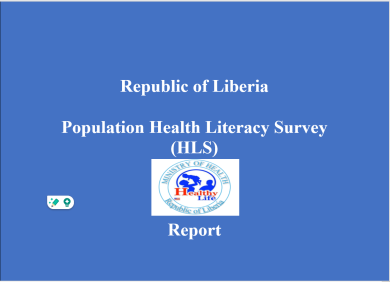
Republic of Liberia Population Health Literacy Survey (HLS) Report- April 2024
Health literacy represents the personal knowledge and competencies that accumulate through daily activities, social interactions, and across generations. Individual knowledge and competencies are mediated by the organizational structures and availability of resources that enable people to access, understand, appraise, and use information and services that promote and maintain good health and well-being for themselves and those around them.
The WHO-supported Health Literacy Survey (HLS) used a quantitative method and strategy for data collection and analysis, which includes primary data collection. This data collection method helps to achieve the study goals and objectives. The survey is quantitative data gathered from structured generic questionnaires developed by the WHO.
Nationally, 3,375 households were sampled with a 5% non-response rate. The National Population and Housing Census (2022) sampling frame was used to determine the sample size needed for the HLS. In the first stage of the sampling, counties were selected. During the second stage (using system random sampling techniques) of the sampling, the required Enumeration Areas (EAs) were selected from the County EAs listing. During the third stage of the sampling, 25 households were randomly selected, and the head of each household was interviewed. The head of household typically refers to a person in a household who is responsible for making important decisions and providing for the family. It’s often associated with financial responsibility and decision-making authority.
The HLS revealed that little over a quarter (26 percent) of the respondents ever search for information health about health. The HLS finding shows that individuals 25-39 years were more likely to search for information about health than any other age group. Eleven percent (11 percent) of people aged 25-39 years search for health information compared to one percent of people 65 years and above.
Nearly 80% of respondents said it was difficult to search online for health information, 80% said it was difficult to find exact information online, and 77% said it was difficult to understand information found online.
In a typical week, 18% of respondents use websites for getting health-related information, 17% use social media, including online forums for getting health-related information, 18% use a digital device related to health or healthcare, and 17% use a health app on their mobile phones for getting health-related.
Findings from the HLS show that nearly two-thirds (65 percent) of the respondents said their health is good, while 10% said their health is either very bad or bad. Nearly, a quarter (22 percent) of the respondents said they have one or more chronic diseases or long-lasting health problems. Over two-thirds (68 percent) of the respondents said they are not impaired, by chronic illness, and a quarter of the respondents mentioned being impaired moderately by chronic illness.
Regarding access to vaccination information, over half (58%) of respondents indicated that it is easy to find, while 42% said it is difficult. Additionally, over two-thirds (68 percent) of the respondents mentioned that it is easy to understand why they need vaccination.
The General HL scores indicate that 45.5% of the respondents have inadequate health literacy, 26.4% have problematic GHL, 23.8% have sufficient GHL, and only 4.4% have excellent GHL.


